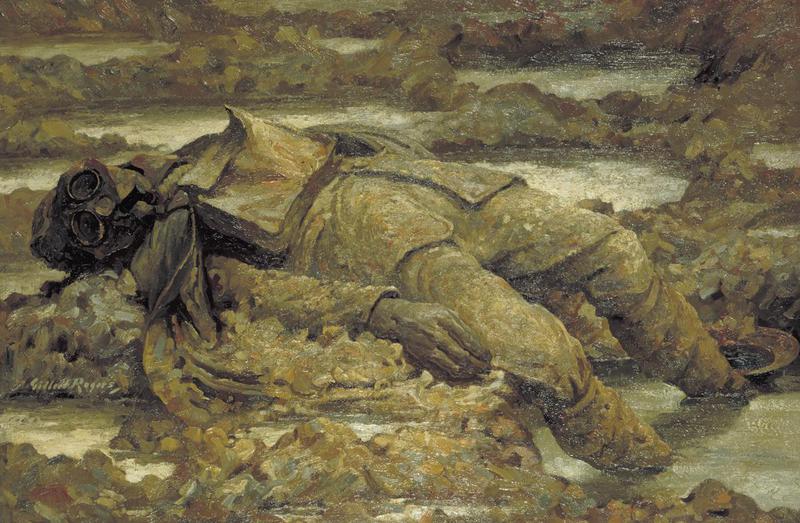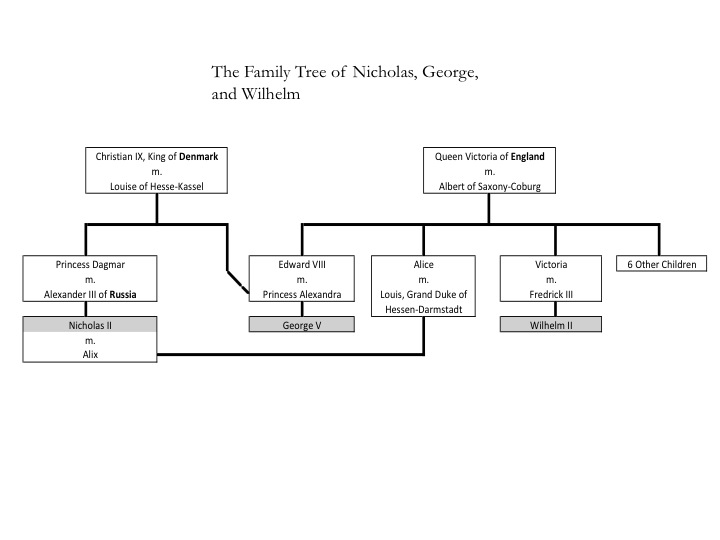by Noah Keates

Imperial War Museum via Wikimedia Commons
A century ago, on June 28th, 1914, Slav nationalist Gavrilo Princip assassinated Austrian Archduke Franz Ferdinand of Austria in Sarajevo, and many historians would concur that this was the ember that was blown into the conflagration of the First World War. But although the archduke’s assassination may have been the catalyst for the subsequent war between Austria-Hungary and Serbia, the eruption of war on a continental scale may have been caused by other factors. Decades of political distress and foreign alliances had set the stage for the behemoths of European military power–England, Germany, Russia– to take up arms. And at the center of this stage stood three cousins, King George V of Great Britain, Kaiser Wilhelm II of Germany, and Tsar Nicholas II of Russia, whose complicated family relationships partly fueled the international animosity that led to the horrors of The Great War.
George and Wilhelm shared a common relation through their grandmother Queen Victoria, while George and Nicholas were bonded through their mothers, the two Danish princesses, Alexandra and Dagmar. Nicholas and Wilhelm shared no blood relation, though they became cousins-in-law when Nicholas married Wilhelm’s first cousin, Alexandra of Germany.
The three cousins grew up under great pressure from the past, and the political leanings of their predecessors molded their opinions and ideas as they rose to power. Though tension existed among the three nations in the decades preceding World War I, the young cousins remained in contact with each other, partially driven by the expectation of courtesy from their common relations, yet also due to a genuine interest in the lives of their social counterparts. However, through the first decade of the 20th century, the bonds among George, Wilhelm, and Nicholas began to be strained.
Queen Victoria acted as one of the strongest influences on two of the young boys, as she grandmothered both George and Wilhelm. Victoria ruled in Great Britain for 64 years from 1837-1901, and acquired the name “The Mother of Europe” due to the number of thrones occupied by her descendants. A special bond quickly developed between the Queen and her first-born grandchild, Wilhelm, in whom Victoria keenly inculcated the appeal and successes of British culture and policy. Wilhelm would acquire great power in adulthood, and Victoria intended to capitalize on the mutual affection with her German grandson to influence German political policy in a direction favorable to Great Britain. However, although the Queen guided Wilhelm towards British influence, she did not encourage the friendship between Wilhelm and the one person who could have cemented the Kaiser’s positive relationship with her island nation, her younger grandson, George, the future king. Victoria disliked the idea of her grandchildren mingling together and kept a general policy to “avoid having more than one set of grandchildren staying at any one time,” according to historian Miranda Carter. Consequently, Wilhelm and George did not form any real relationship as children, which might have induced a stronger bond between the two rulers as they rose to power.
Victoria was not the only one to discourage this friendship. George’s mother, the Danish Princess Alexandra, still harbored resentment towards Germany stemming from the brutality of the Prussians towards her kingdom in the Dane-Prussian War of 1864. Otto Von Bismarck, the German chancellor, had orchestrated this conflict to aid in the unification of the German state and to cement a political alliance with Austria, who offered military support in the struggle. Alexandra also fostered the bond between George and her sister’s son, Nicholas II. Nicholas made the long trip across the continent with his Danish mother, Dagmar, to visit his British cousin, and the two quickly developed a strong bond that would persevere through the hostility between Russia and Great Britain in the final decades of the 19th century.
Through the Danish sisters and Queen Victoria, a social dynamic quickly formed among the three cousins, in which Wilhelm constantly found himself on the outside, isolated on both sides by anti-Prussian feelings.
From the early years of their reigns, a game of influence and power quickly developed among George, Nicholas, and Wilhelm, each looking to seize the political advantage over the other. Wilhelm grew to favor Russia over Great Britain, deeming it a necessity to form an alliance with one of these countries in order to prevent an alliance between Great Britain and Russia that would leave Germany flanked to the east and west by two of the strongest military forces in Europe.

Nicholas and George (via Wikimedia Commons)

Wilhelm (via Wikimedia Commons)

Illustration by Noah Keates
Wilhelm, for his part, saw an opportunity to capitalize on younger Nicholas’s political inexperience and influence the recently crowned Tsar. Although some hard feelings existed between the two young men due to their common romantic interest in Alexandra, who became Nicholas’s wife, the Kaiser overcame this envy in order to attain a Russian alliance. Wilhelm aggressively forged a friendship Nicholas, soaking him in compliment and flattery, and tired to mold his political ideas, according to historian Robert K. Massie. At first, Nicholas embraced the support of the older more experienced Wilhelm, seeing him as a mentor. However, as the years passed, and the tsar accumulated experience in the political world, he began to find Wilhelm’s influence as more overbearing than helpful. Nicholas had a greater interest in maintaining his relationship with his long-time friend George, a friendship that became increasingly difficult as Great Britain and Russia’s always tense relationship stretched thinner. However, guided by similar influences as children and similar interests as adults (each was extremely fond of his nation’s navy), the relationship between the two remained cordial.
While Nicholas and Wilhelm had obtained their thrones as young adults, George’s father, Edward VII, remained king until almost the eve of the War, meaning that the friendship between George and Nicholas did not factor into the politics of these rival powers. But when George ascended the throne, this bond became crucial in the arrangement of pre-war alliances. And as George and Nicholas forged a bond between Russia and Great Britain, Germany became more isolated.
By 1907 the Triple Entente had been formalized, officially forming the political alliance among Russia, Great Britain, and France. Three years later, upon Edward’s death, George at last acquired his throne and he and Nicholas could meld their life-long friendship into political reality. At the same time, Nicholas’s growing annoyance at the Kaiser escalated to contempt. Encouraged by Wilhelm, Nicholas had waged war with the Japanese in an effort to acquire a warm-water port on the pacific, but this military campaign ended in catastrophe, with Russia’s seemingly superior forces decimated by the smaller Japanese army. This was the final straw for the Tsar.
To make things worse, this defeat in the east along with a host of social and economic issues caused a growing animosity towards Nicholas in his own country. With the deterioration of this relationship between Tsar and Kaiser, tension emerged between the two nations.
There is no doubt that numerous factors contributed to the rising animosity among nations that erupted into World War I. However, the social dynamics of Wilhelm finding himself the odd-one-out in the family from an early age and his struggling to join the previously existing friendship between George and Nicholas may also have played a part. It is amazing, and saddening, that the projection of a family’s dynamics onto the global scene in the form of shifting national alliances could have consequences as global and as horrific as the First World War.
Noah Keates is a junior at the Bancroft School, Worcester, Massachusetts. His interests are history and politics, especially concerning Europe, and he hopes to study political science in college.
0
0
1
30
171
WPI
1
1
200
14.0Normal
0false
false
falseEN-US
JA
X-NONE/* Style Definitions */
table.MsoNormalTable
{mso-style-name:”Table Normal”;
mso-tstyle-rowband-size:0;
mso-tstyle-colband-size:0;
mso-style-noshow:yes;
mso-style-priority:99;
mso-style-parent:””;
mso-padding-alt:0in 5.4pt 0in 5.4pt;
mso-para-margin:0in;
mso-para-margin-bottom:.0001pt;
mso-pagination:widow-orphan;
font-size:12.0pt;
font-family:Cambria;
mso-ascii-font-family:Cambria;
mso-ascii-theme-font:minor-latin;
mso-hansi-font-family:Cambria;
mso-hansi-theme-font:minor-latin;}

What a fascinating story. I have never heard European history told through this lens. Thank you for including this interesting tale in the publication.
That is so sad, that one of the factors of ww1 is because Wilhelm was the mis-fit and felt left out because George and Nicolas had a strong bond.
Interesting, never really learned about WW1 in history class.
I was never taught World War I or II. This was very interesting but also very tragic. Victoria seems to have made a mess.